Tell me Your Favourite Beethoven Piano Concerto No.1?
Posted by: kuma on 07 August 2012
Been listening to this tune a lot lately and curious what your favourite is.
My fave by far is the Michelangli/Giulini/Vienna Phil DG vinyl but I'm sure I need to listen more.
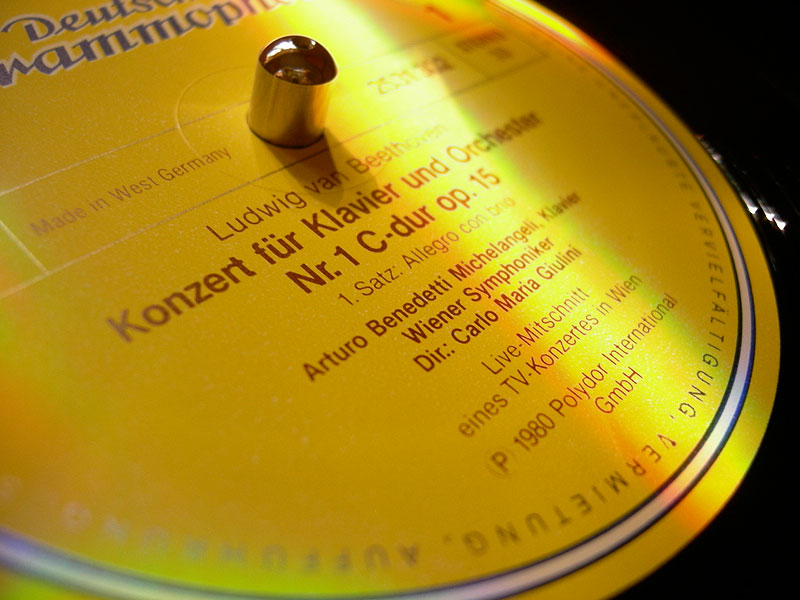
This is a bit of a Mozartian-Beethoven tune.
In your CD, Schubert's B Flat Major is listed.
How is it?
Kuma,
I like his Schubert sonata, though it's not my favourite version. I find it a little bit 'stiff' and slightly lacking the romantic, emotional sound in the D960 that I prefer.
If I may, I'd like to recommend to you the D960 played by Ronan O'Hora on the Tring label - you may be able to track a copy down (amazon.co.uk has a couple of new discs on sale at the moment). It may not be a 'conventional' recommendation, and not the greatest recording quality,but it is fabulous playing. In this version you can really understand why, in Schubert, the silent moments are just as important as the music. ![]()

Thanks WW,
I will look out for one. I have not heard of the pianist.
My favourite D960 so far is by Artur Schnabel.
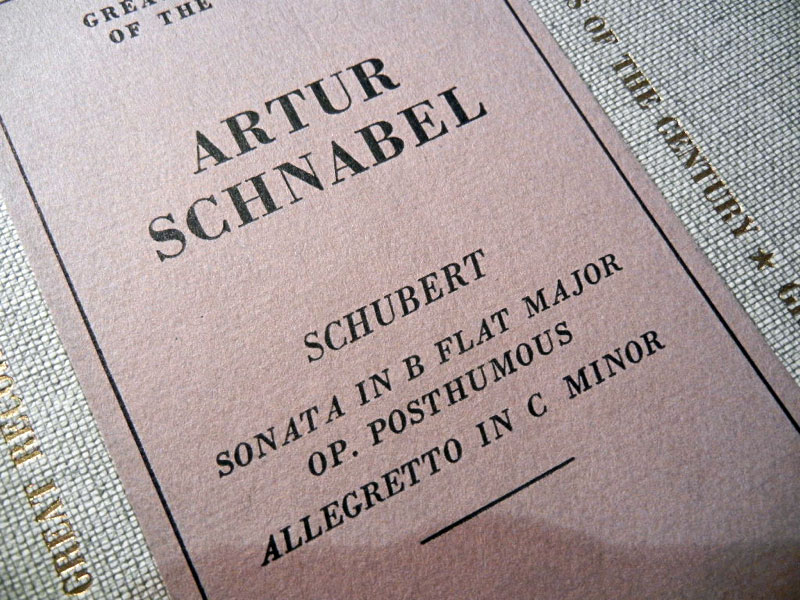
This was recorded in 1939 but surprisingly sounds very decent. There is a warmish nostalgic overtone.
I felt that this is a sort of program fitted for Schnabel as it does not requries to be overtly virtuostic. Plenty of emotions filled in the note he delivers. Quieter the keys, I can feel the significance or meaning under them. Schnabel astonishingly transpraent in these tunes. Nonchalant lyrical right hand contrasting the omious deep seated left hand trils. There is no upstaging or showing off. Schnabel tells his story in somewhat in monotone flashback manner. One of the most moving 2nd movement I have heard so far. He also really lets the silience do all the talking.
Thanks WW,
I will look out for one. I have not heard of the pianist.
http://www.allmusic.com/artist...n-ohora-mn0002184646
A really excellent pianist, Kuma. Trust me. ![]()
This was recorded in 1939 but surprisingly sounds very decent. There is a warmish nostalgic overtone.
I draw the line when the recording is older than I am, Kuma ! ![]()
This one is..... by just a few years.
WW,
I've discovered some wonderful pianist from listening to very old recording.
Like Paderewski! It's like a time machine.
Now, getting back to the Beethoven No.1 program, here's another Ashkenazy.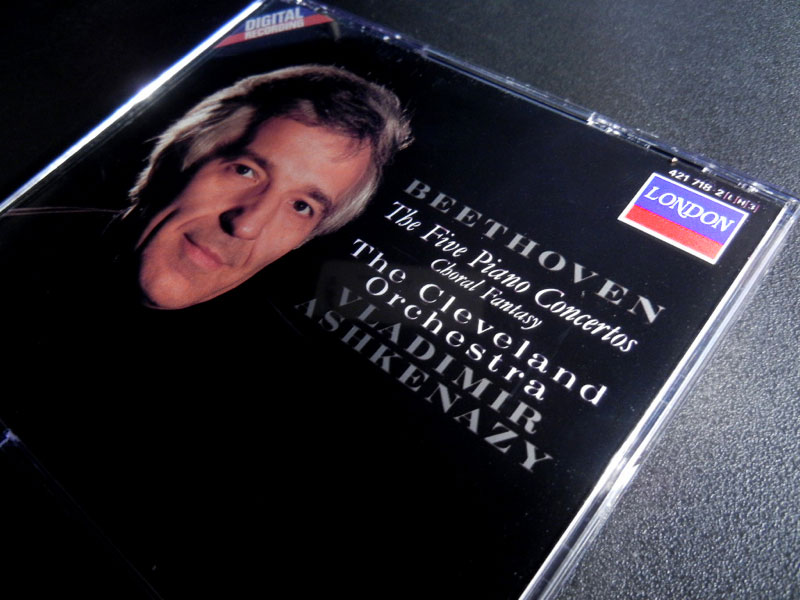
He made all together 3 complete Beethoven cycle. The first set is the most well known. The one with Solti/CSO in the 70s.. Then the second set with Mehta recorded in '84 with Vienna Phil.
The last one is this '87 recording with the Cleveland Orchestra and Ashkenazy as a conductor.
The sound of Decca digital in the 80s isn't as good as the Phillips as it is slightly brittle and there is a dynamic compression happening at the orchestra climax. Interestingly, Arrau's No.1 was also released in the 1988 and I certainly much prefer this mix than Decca's early CD. There isn't much of a soundstage, but I can appreciate its immediate and clear stye with a realistic piano tones and good bits of 'digital' authority down below. The balance is nothing like their Decca sound from the Golden days of vinyl for sure.
For the performance, the orchestra starts out with a upfront and perky intro. Gone is a demure simpleton entrance I have heard in Solti set. It has a dance like funky feel with a toe tapping rhythm albeit he still stays in a traditional veins with a clean, concise and no-nonsence rendition for the piano solo. For orchestra, he's going for the regent air with taught timpani accents. But he does not add much of textural layering or not much of temporal manipulation to keep the tension of the tunes.
The overall result, I find lacking a deeper emotional insights. And since there is no dazzling technical feats, the whole thing ends up somewhat middle of the road. It is, however, highly likable with an easy to follow bass line. Interesting he opted for a shorter cadenza zipping through the 1st movement as quick as Bakhaus or Kempff but he offers very little take aways afterwards. I prefer his early cadenza with Solti for sheer drama making. Also I miss the Yin-Yang with orchestra even his piano playing is more confident in this set. Aside from the intro I've got a feeling Ashkenazy is down playing the orchestra to the piano contrast to Solti/CSO which was the other way around.
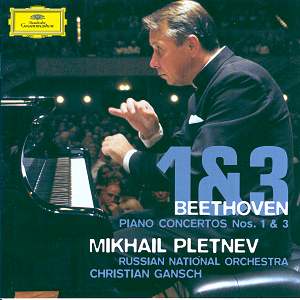 I have read that Beethoven was a real wiz at improvisation.
I have read that Beethoven was a real wiz at improvisation.
This is a 2007 recording of Pletnev/Gansch set and in the liner notes Pletnev talks about he wanted to create the same kind of *with it* stream-of- consciousness-improvisation throughout the Concerto in this live setting.
Fidelity wise, this is clear and spacious recording and overall has a warmish tonal balance. There is still a slight edge of brightness and congestion in massed strings,but I like the a close mic'd upfront piano to give a good sense of clarity.
A Blüthner piano was specially made for Pletinev for this ocasion. I am not a piano nerd so I don't hear any particlarly special about it. In this recording it sounds like a full boddied Yamaha grand to me.
On to the performance.
Following a brisk but dignified orchestra intro, an odd entrance on piano where I can hear some hesitation and strange tempo manipulation going on. This is not quite what I expected.
Pletnev speeds up and down in a few spots with an astonishing command of the keyboard. He never blurrs out a single note maintaining an individual strands of ascending or descending notes. A Unorthodox but exciting 1st movement clocking well under 14 min. This uneven tempo continues throughout and it does feel he's trying too hard to *improvise*.
It's kind of defeating the purpose of improvisation if a listener see the mechanism of it but much more entertaining than bland executions. Pletnev's slow movement is cool and aristocratic. It's too upfront and stiff for my taste and missing the feeling of that intangible sweetness. The occasional manipulation of tempo pulls me out from getting into the music.
Some of the riffs in rondo sounds like a hecups for instance. I am not sure if this is a successful improvisation he intended. It's coming off like a classical pinist trying to adlib like an old jazz pro. It's all stiff and trite. Throughout the concert, I got the feeling that the orchestra does't add much. This is a Pletnev Show and sounds like the concert was a huge success as there is a thunderous applause at the end.
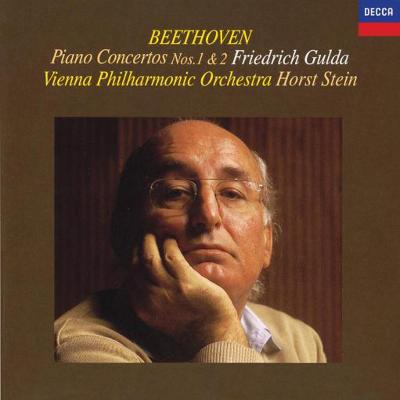
Speaking of hybrid classical and jazz pianist, I've listened to Freidrich Gulda's Beethoven Concertos.
I was only familiar with his Mozart's work with Chick Corea and Harnoncourt.
His style also has a strong element of improvisasion.
This is a 1970 recording with Vienna Philharmonic under Horst Stein whom I am not at all familiar with.
A shocking contrast to Pletnevs' SOTA Blüthner. Gulda's piano sounds a bit like an old fashion pianoforte.
What a difference in how each pianist improvises the same score! Gulda's style is much simpler and unassuming. Yet he's maintaining a very natural improvisation-like feel. A note doesn't seem so keyed up and pre meditated like Pletnev's.

Rhythmically more alive and he infuses the breathing quality to the music. He can be assertive but the piano integrates better with orchestra, too. He does not have an acrobatic finger work of Pletnev, so he does not *wow* with technical wizardry. Yet his octave sliding is much more expressive. There seems to be more shading and colours on notes so that the tunes do not get monotonous. Gulda's got the right playful attitude, too.
His work reminds me of Aubrey Beardsley's illustration with many fluid fanciful lines.
The slow movement isn't overly sweet or melancholy but his touch of keys got a singing tone and very addictive. The music simply breaths. Stein's orchestration is sensible and equally thoughtful and elegant but never brings down the pianist. ( sort of like Böhm school of directing )
It has been fun to find a good performance from the old catalogue.
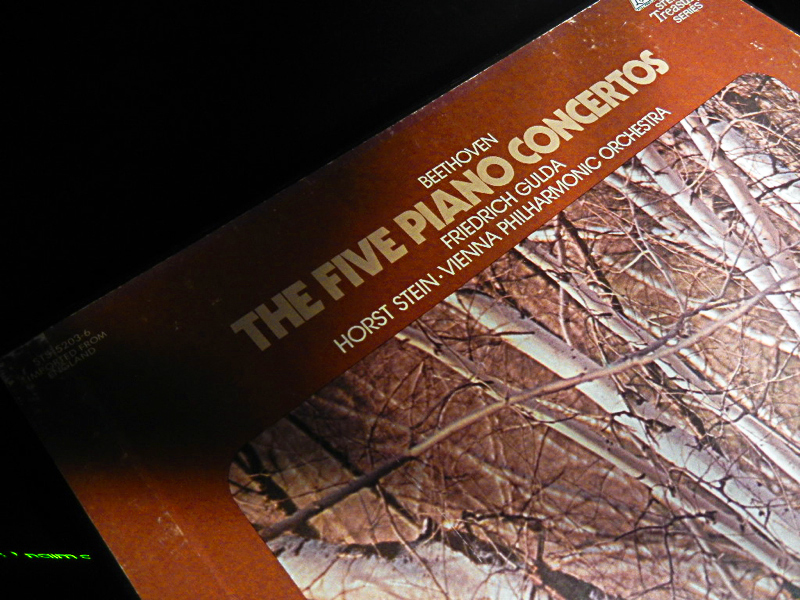
I still have yet to listen to Brendel/Rattle's PC1, but this is an EMI1995 release of Rattle/City of Birmingham Symphony with a young German pianist Lars Vogt ( he was 25 year old when this recording was made ).

I have never heard of this pianist but what interested me was this set uses rare Glenn Gould's Beethoven Cadenza writtten in 1955.
Beethoven wrote 3 cadenza for the Concerto No.1 and so far everyone opts for the original composers cadenza.
My favourite Kempff/Leitner set uses Kempf's own witty cadenza. It's subtle, but he manages to embed his personality into the score.
The sound of this CD is clean but typical 90s digital recording with sharp leading edges on massed strings and clingy upper register piano. The copy I have is a US version so the original EU pressing might be better. Piano's tonal balance could be warmer, too.
The program starts with a sluggish Orchestra entrance but a minute the piano enters with exceptional clarity and sunny disposition he brightens up the whole music. Vogt balances both the sensibility and guts. When he starts on Gould's cadenza in the tail end of the 1st movement, I busted out laughing! It sounds like a demented Bach! Its just great that he plays it with a fun and playful attitude. There's unmistakably Gould everywhere on this cadenza but oddly it's gelling with the score written 200 years ago! One of the most entertaining 1st movement I have heard so far.
The 2nd movement does not have the same level of depth or insights of zimerman or Kempff. But the outer movements are blazing fast and fun with a good sense of humor.
Comparatively to Lang who was also 25 year old when he recorded, does not have the same maturity as Vogt. Rattle's orchestraion isn't very snappy or texural but contrasting Vogt's extra dry carefree style. The softer legato orchestra in the dance sequence in Rondo feels just wrong, where they should be dancing together with the piano. Again Gould's zany cadenza in Rondo is a hoot!
Cadenza is for showcasing pianist's technical and creative ability. I am surprised that there aren't many pianists coming up with their own segments.
Evgeny Kissin has made Beethoven Piano Concertos No.2 & 5 recording in 1997 (Levin/Philharmonia ) but 10 years later he has recorded the complete set with Colin Davis with LSO.
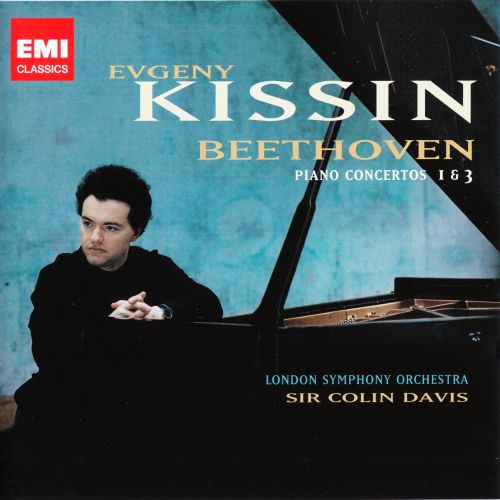
This is a well produced Abbey Road studio recording with no hint of distortion and has a neutral tonal balance. Excellent clarity and seamless top to bottom frequency extensions albeit this is still not in the same calibre as the early 80's Philips, JVC or Denon digital. it is certainly better than Lang's DG disc or Decca's Barenboim discs recorded in the same year. I think in general EMI recording has gotten a bit better than their 90s releases.
Following an unassuming entrance, he maintains this even tempered presentation. He doesn't get daring or creative delivering a straight forward clear rendition. Davis' orchestration sounds a bit tired and would have loved more fire in the belly.
The 2nd movement is just a time passer. Neither parties want to get involved or wear hearts on their sleeves. Both are extremely reserved keeping the card closer to their chest. The melody lines do not evoke any emotional responce ( at least for me ).
So we have this even keeled somewhat academic sounding first 2 movements and then Kissin decides to get to work on the Rondo.
The fastest Rondo intro (clocking @a tad over 8 min!), sounds like a record running at a wrong speed. A good way to showcase his technical skils, but coming off completely from the left field not gelling with the rest of the movements. LIke where does this come from?
Much too much serious lacking wit completely void of musical rhythm.
If his ticket pricing indicates that he's immensely popular and still on the A-list talent but I don't get what is so special about him.
I got tired of waiting for a good condition vinyl to show up so decided to just order a CD. This is a 2007 reissue by Sony/BMG called 'Jubilee Edition'. As I looked at Gould's catalogue, the number of so-called 'special edition' make it very confusing. There was a Beethoven 5 Concertos released back in Oct. but I am not sure if this is the same remix as the Sony/BMG release which is pressed in Europe.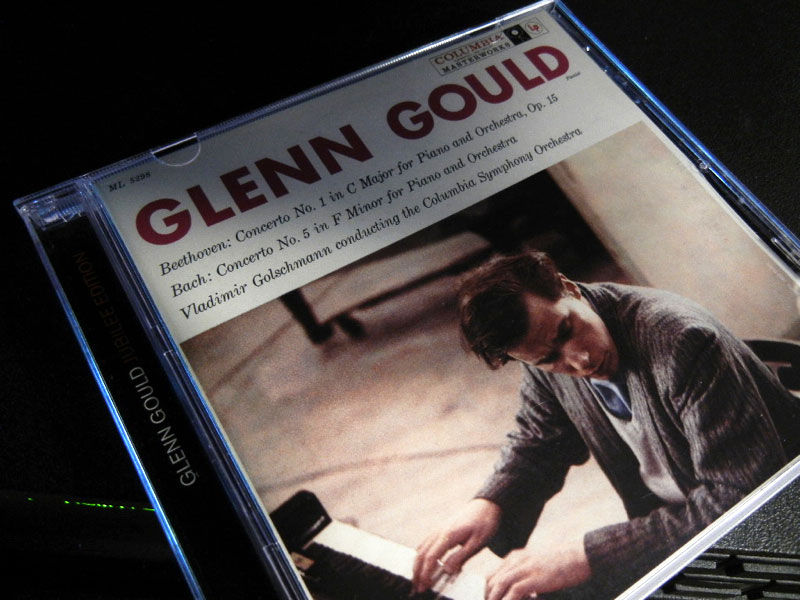
This is a mono mix but oddly sounds better with a mono switch on the 52 unengaged. It's a budget reissue so I wasn't expecting much of it but it turned out this is excellent for the peirod recording with immediate perspective. There are no apparent peakiness in piano or massed strings, too. There is a tape hiss through out but it's not intrusive and rather its clarity of instruments showcase Gould's lighteing fast fingerwork. Looks like the engineers took out most of Gould's humming.
I wasn't familiar with Vladimir Golschmann at all but liner note says that he was one of the few conductor Gould got along well. I see why.
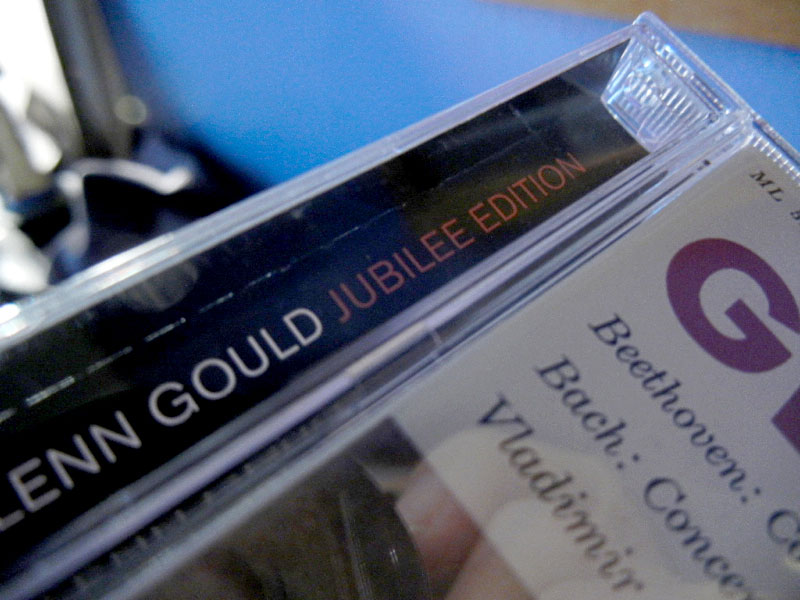 His upbeat and staccato orchestra matches Gould's machine gun style finger work. Certainly Gould didn't have to fight with a slo-mo Rattle as Vogt had to. I am not sure who sets the overall tempo but I'd reckon mainly the conductor gets to decide at what speed the music should be played. Their 1st movement is lively yet smooth and detailed since individual instrument is well served particularly winds and string plucks provide fresh accents along the way.
His upbeat and staccato orchestra matches Gould's machine gun style finger work. Certainly Gould didn't have to fight with a slo-mo Rattle as Vogt had to. I am not sure who sets the overall tempo but I'd reckon mainly the conductor gets to decide at what speed the music should be played. Their 1st movement is lively yet smooth and detailed since individual instrument is well served particularly winds and string plucks provide fresh accents along the way.
Stylistically Golschmann is similar to Harnoncourt providing a lot of textural interests. But the orchestra never swamp or overwhelm the pianist. They work well together to achieve the same sonic goal. Gould's piano playing is fun, exhilarating and his own cadenza is a sheer delight with astonishingly contemporary feel yet works with the original score. He delivers it with the clearest of diction and conviction. The 1st movement is clocking at 12:51 timing in as a second to Geiseking's at 12:18. ( the fastest Allegro con Brio so far). Golschmann gives equally a strong *period* at the end right on time. Oddly, they go back to more common tempo on other 2 movements.
The 2nd movement is surprisingly delicate with care and excellent timing and inter relationship to the orchestra. There isn't much of filgrees from either the piano or the orchestra, but the tension is created between them. 24 year old Gould's melody is mature, retrospective and he gives that breathing quality to the music. I am surprised that he does not make the tune sound corny and does not make me aware of deliberately *playing the piano*.
Rondo has just the right funky attitude finished off with his avant-garde cadenza. Gould calls it 'dynamic decrescendo' I think it's absolutely brilliant. Vogt's execution of the same cadenza sounds tame in comparison. These were written in 1954 which makes Gould a 22 years old when he wrote them.
He was not on the original Recommended List as I think he's more known for his Bach work but I also like his Beethoven work. ( notably for his Beethoven's Late Sonatas and LIszt's transcription of the 5th Symphony )
Anyways, this Glenn Gould's Piano Concerto No.1 is added to 'My Favourite List' now.
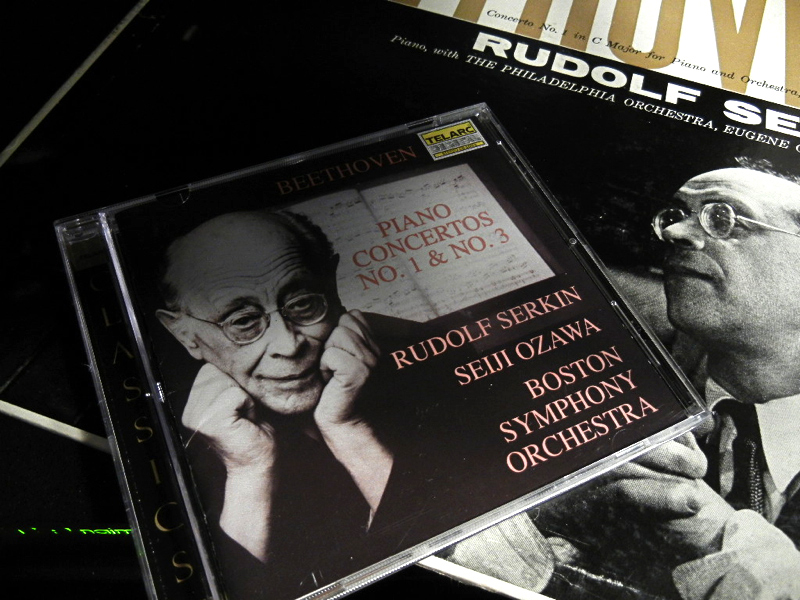
Rudolf Serkin recorded Piano Concerto No.1 6 times in his life time and this set with Ozawa on the Telarc label is his last one.
This is recorded in 1983 the same year Ozawa has recorded the No.1 with Argerich with Bavarian Radio Symphony. I am not a fan of Ozawa or Telarc but you never know.
Sure enough, this sounds like the polarity is reversed as the midrange is recessed piano sounds too far away. And it has an overall laid back perspective. I suppose its spacious and bloomy bass warmth can be attractive but I normally much prefer closer immediate disposition. This recording has a very strange unnatural balance.
From the first note out, the orchestra is lacklastre void of any punctuations with this tired lazy sound. There is no tenstion and everything sounds too mellow and notes are swimming in a pastel hued soundscape. Serkin's clear tone is a welcome adding some spices to the boring Ozawa's orchestration but he, too is lacking. His earlier set recorded in '54 with Ormandy shows mischievous sparkling persona which the attitude needed for the outer movements. It even had his slight preference in Bach like flavour in some spots and Rondo sounds surprisingly modern. ( Perhaps this is the same reason Gould gave a fugal movements in his 1st movement cadenza. )
This set needs some point of view as well as fire and passion. The 2nd movement is pretty and romantic but that's about it. Rondo is particularly painful to listen to as clearly the aging pianist is running out of energy to finish the score properly.
Compared to Arrau's *swan song* PC1 with Davis, Serkin/Ozawa set falls short musically and in fidelity. They were both early digital recordings, but the Phillips engineers had far better ears than Telarc.
If there was a special reason for Serkin to record this piece again, I missed it entirely.
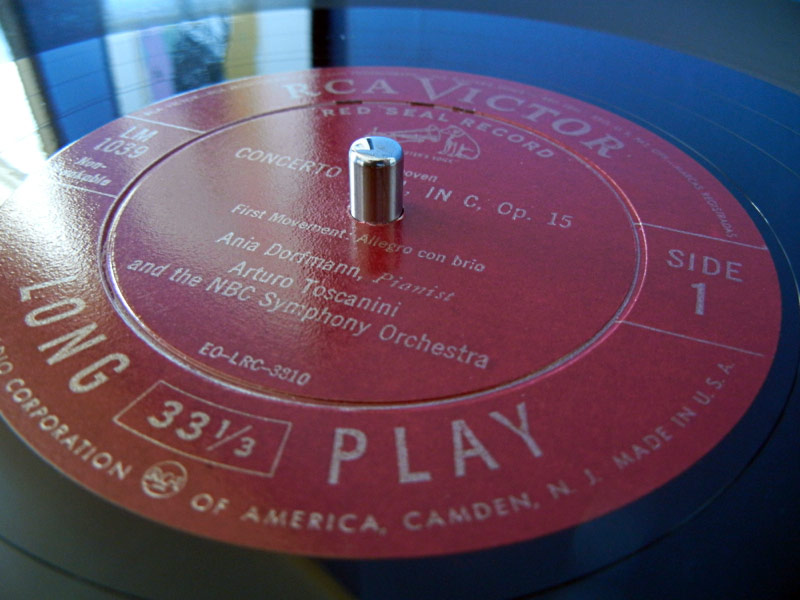
Ania Dorfmann, according to Toscanini's discography, recorded Beethoven Piano Concerto No.1 3 times all with NBC Symphony. She was the first female solo pianist to accompany Toscanini.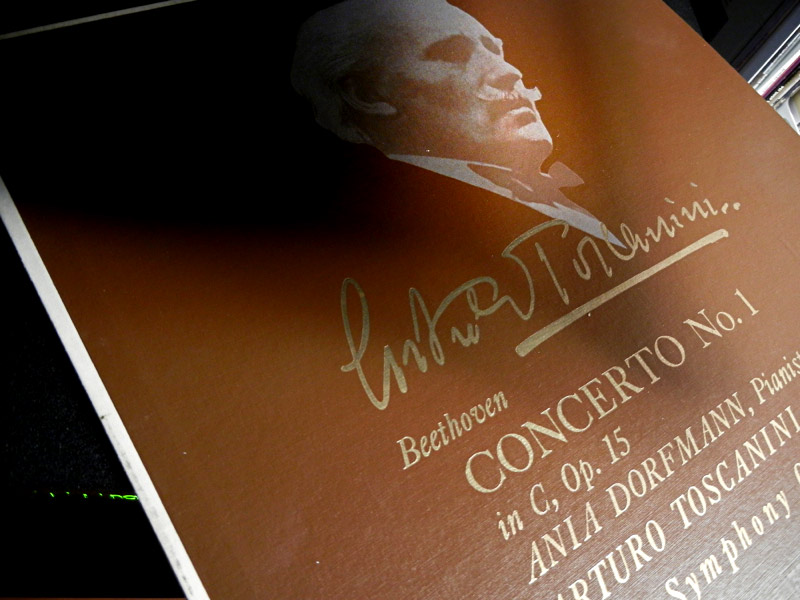 This RCA vinyl 1950 reissue is from 1945 at Carnegie Hall. In spite of its mint condition, unfortunately the self noise if quite high in that probably below historical grade. Judicious use of digital *clean up* might have been justified in this case.
This RCA vinyl 1950 reissue is from 1945 at Carnegie Hall. In spite of its mint condition, unfortunately the self noise if quite high in that probably below historical grade. Judicious use of digital *clean up* might have been justified in this case.
Toscanini/Dorfmann performance was recommended highly and I am a fan of the Maestro, so I was happy to find a copy.
They start the program extremely fast and maintaining the tempo all the way through. This is the first time I listened to Dorfmann. She's hard and angular with firm muscular note delivery but lacking fluidity and subtle nuances. A bit like Helene Grimaud. But I could see the skilled long cadenza could have impressed the audience in those days. There are a few misplaying that I can hear, too. They aren't a big deal if the performance was to my liking. She's no Annie Fischer or Argerich on a good day.
Even faster Geiesking's 1st movment ( a little over 12 min! ) is ever more lyrical than Dorfmann's rendition of the Allegro con Brio. The 2nd movement does not have much emotional feel either ending up mechanical and academic. Toscanini takes a legato style here without his usual rhythmic flair. So this slow movement is literally slow and dull.
Dorfmann comes back with a strong linear left hand giving the tune a solid bass foundation and rive on the final movement, but can't pull off funky dance segment in spite running the shortest Rondo at 8:10 min.
The whole package is played as a matter of fact with not much flavour of anything. This combo just lacking playfulness and attitude. Disappointing as I was expecting to hear something fun.
Erm, Kuma, I'm really impressed that this thread is still active. However ![]() , just how many versions of the first do you now own !!
, just how many versions of the first do you now own !! ![]()
![]()
Was Howard Hughes or Randolph Hearst your Grandad by any chance ??? ![]()
Regards (with envy), WW.
LOL.
If George can keep his Carlton thread indefinitely I can keep this thread alive as my pet project. ![]()
From the original check list:
- Richter/Munch/BSO
- Fleisher/Szell/Cleveland
- Pierre-laurent Aimard/Harnoncourt/Chamber Orchestra of Europe
- Toscanini/Ania Dorfmann
- Bronfman/Zinman
- Richter/Kondrashin
- Zimerman/VPO
- Argerich/Sinopoli
- Argerich/Ozawa
- Richter/Munch/BSO
- Arrau / Haitink
- Goode / Fischer
- Shelley / Shelley
- Barenboim / Barenboim
- Pletnev / Gansch
- Uchida / Sanderling
- Ax / Previn
- Kempff / Leitner or van Kempen
- Backhaus / Schmidt-Isserstedt
- Gilels / Szell
- Serkin / Ozawa
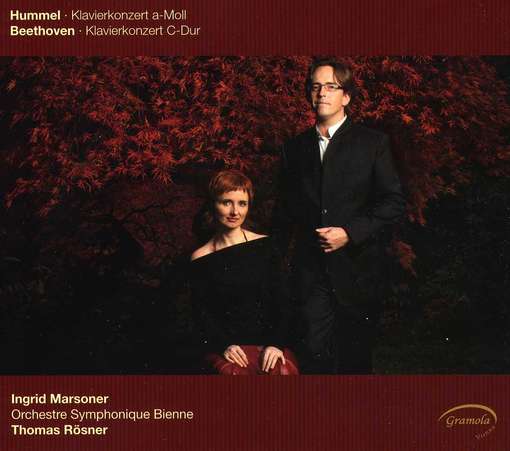
Since I seem to be on a Pollini kick lately, it's time to listen to his No.1.
This is the same album with Jochum/Vienna Phil. as yeti mentions earlier on Page 3 on this thread.
Recorded live in 1982, this early digital recording is no match for early Phillips, Sony or Denon. There isn't much bloom or ambiant air in spite this is a live recording. Piano is up front and close mic'ed so one can get to appreciate Pollini's ultra precise technique. Decent low end extensions and low self noise.
Jochum's direction is rhythmically off from the top and soft and benign. Piano sounds bright and vivid adding some sparkle to this somewhat dull orchestration. I could see that a CD release could dial up brighter balance on piano making the tune relentless to listen to. ( like '83 Argerich/Sinipolli DD CD )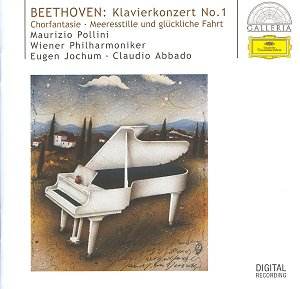 This is a perfect tune to showoff Pollini's technical ability. Extremely fast and polished note is delivered with a surgical precision and coolish attitude. Interestingly this Vienna Phil recording has a very different balance from Böhm set a few years earlier where orchestra sounds more sophisticated and silkier textures. Strings on the 2nd movement is a tad hard and heavy handed without much lucidity. Pollini's delivery also lacks the feeling of yearning or any melancholic notion. Rondo sounding stiff with no sense of humor or fun.
This is a perfect tune to showoff Pollini's technical ability. Extremely fast and polished note is delivered with a surgical precision and coolish attitude. Interestingly this Vienna Phil recording has a very different balance from Böhm set a few years earlier where orchestra sounds more sophisticated and silkier textures. Strings on the 2nd movement is a tad hard and heavy handed without much lucidity. Pollini's delivery also lacks the feeling of yearning or any melancholic notion. Rondo sounding stiff with no sense of humor or fun.
None of beautiful soul digging lyricism I have heard out of his Chopin pieces are translated to this tune. Makes me wonder what happened here.
Later release Abbado/Berlin Phil. set might be better?
Kuma, curiously, there is no great recording of Pollini playing Beethoven's concertos. I agree with you that his performances with Böhm are the best of the lot. His later recordings with Abbado are all professionally done without the feeling that either Pollini or Abbado was very interested in the project. IMO of course.
EJ
EJS,
Thanks for your comments. I'll get to the Abbado set sooner or later.
P.S. Next week is the Tristan und Isolde live at CSO! ![]()
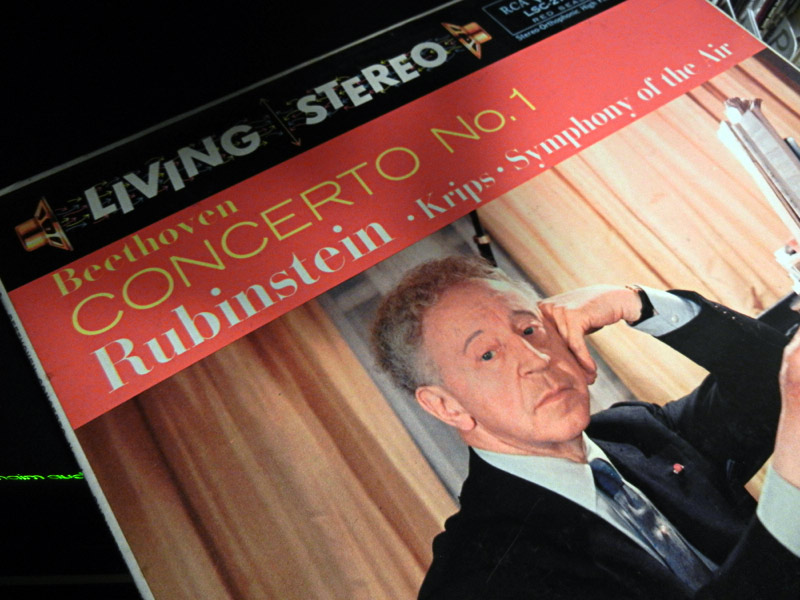
This is a familiar '58 RCA Living Stereo Rubinstein's PC1 with Josef Krips conducting.
Rubinstein recorded several others including later Barenboim and Leinsdorf. I am yet to be convinced that he's the right man for Beethoven work.
He's too nice. Everything is rounded off and soft. Even keeled gentle conservative Beethoven feels just wrong to me.
Unlikely that Pollini will record the Beethoven Piano Concerto again. He was suppose to play the Emperor Concerto last year but due to his health, ended up playing Mozart instead!
All of Beethoven's concerto require horses like stamina to pull it off.
